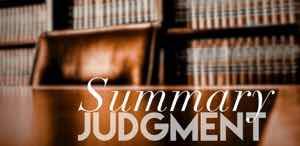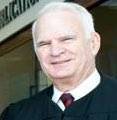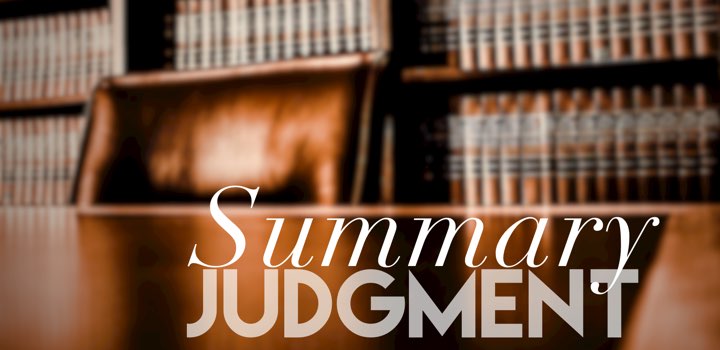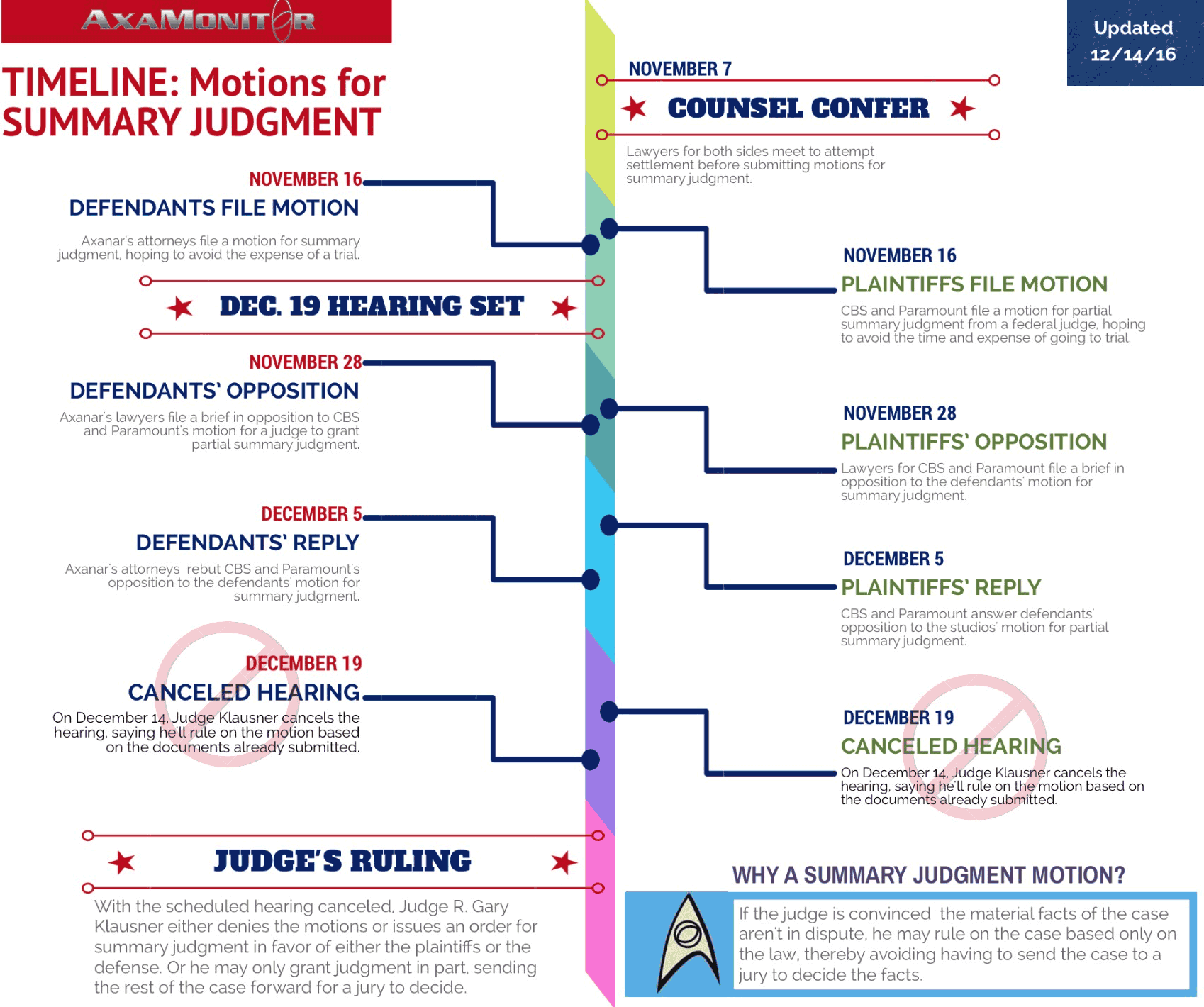Table of Contents
Explainer
Judge Cancels Summary Judgment Hearing
See also: Plaintiffs Cite Peters' Shocking Personal Spending in Asking Judge for Summary Judgment and Axanar Defense Also Asks Judge for Summary Judgments
Federal Judge R. Gary Klausner canceled the schedule summary judgment hearing, according to a scheduling order posted December 14, 2016. The hearing — oral arguments by attorneys for defendants Alec Peters and his company, Axanar Productions and for plaintiffs CBS and Paramount Pictures — was to have been held December 19 in Los Angeles.
Hearing Canceled
The scheduling order noted that the hearing was taken “off the motion calendar. No appearances by counsel are necessary. The Court will issue a ruling after full consideration of properly submitted pleadings.”1)

By that date, attorneys had filed opposition briefs to one another’s motions (the studios' motion was only for a partial summary judgment) and replied with rebuttals to that opposition.
Judge's Decision
Cancellation of the hearing means the judge’s decision could come at any time. He could rule for or against either side’s motion, based on the arguments and evidence already submitted, or he may issue a ruling of his own. He could also make a summary judgment on only the parts of the case where he believes material facts aren’t disputed and send the rest of the case to a jury for its findings on facts.

Hearing Habits
In keeping with his reputation as a no-nonsense judge, canceling hearings is not new for Klausner. One attorney wrote in the judicial rating site, The Robing Room:
[He] cancels hearings at the last minute when he knows you’ve got a distance to go — then takes papers on submission anyway.2)
Klausner similarly canceled a scheduled hearing earlier in the Axanar case regarding the defense’s motion to dismiss the case, going on to roundly reject most of the arguments by defense counsel Erin Ranahan.
While it’s impossible to know how the judge will rule, it is clear that between three rounds of court filings regarding the summary judgment motions he had heard enough. His ruling could come at any time. The case is otherwise scheduled for trial on January 31, 2017.
Summary Judgments
While motions for summary judgments are generally not granted, one lawyer noted that Klausner’s penchant for efficiency makes it more likely he would make some kind of summary ruling:
Great judge who makes the legal system as efficient as can be. He is fair on evidence and treats each party equally. He is also not hesitant on granting motions for summary judgment, which is helpful when your client is spending lots of money to defend a meritless case. 3)
Timeline
Federal courts follow rules outlining deadlines for the legal filings required to support summary judgment motions.  The timeline below describes what happens at each stage of consideration for the motions, with each side allowed to argue against the other’s motion, and then to rebut the opposition. Normally, attorneys deliver oral arguments before a judge, though not in this case.
The timeline below describes what happens at each stage of consideration for the motions, with each side allowed to argue against the other’s motion, and then to rebut the opposition. Normally, attorneys deliver oral arguments before a judge, though not in this case.
Earlier Filings
Lawyers filed replies on December 5, 2016, to one another’s opposition for the summary judgments sought by both sides in their last filing before the scheduled hearing on the motions before federal Judge R. Gary Klausner on December 19 in U.S. district court in Los Angeles.
The first replies to one another’s motions for summary judgment were filed November 28 in U.S. district court in CBS and Paramount’s copyright infringement lawsuit against producer Alec Peters and his Axanar Productions.
The two sides filed their separate summary judgment motions November 16. The November 28 filings were briefs of opposition to one another’s motions.
Early End to Lawsuit
A motion for summary judgment is a means for one party bring an early end to a lawsuit:
[The motion] is a request for the court to rule that the other party has no case, because there are no facts at issue. The party making the motion is claiming that either the case should not go before a jury at all, or a jury could only rule in favor of the moving party.
In order to win [a motion for summary judgment], the moving party must show that:
• There are no facts which can reasonably be disputed; or
• Anyone looking at the facts and applying law would rule in favor of the moving party.4)
Axanar submitted a motion for summary judgment, while lawyers for plaintiffs CBS and Paramount filed a motion for partial summary judgment, each motion requiring a complicated exchange of legal briefs in advance of the hearing before Judge Klausner, as shown in the timeline below.
What's In the Motion?
Under the Federal Rules for Civil Procedure, and the additional local rules in the Central California District, each motion for summary judgment must include a:
- Proposed “Statement of Uncontroverted Facts and Conclusions of Law,” asserting the material facts to which there is no genuine dispute.
- Proposed judgment being sought.5)
- Statement declaring the two sides conferred at least seven days before submitting the motion and were unable to figure out a way to resolve their differences.6)

Attorneys for Axanar and for the studios have met several times in recent weeks as part of court-mandated settlement talks. Their most recent meeting was scheduled November 14, two days before the cut-off date for submitting the motions.
Partial Judgment
The rules also allow each party submitting a motion to request the judge rule just on specific individual claims, defenses, or issues if partial summary judgment is sought.
Filed by Opposing Party
The opposing side must submit its own document, a “Statement of Genuine Disputes of Material Fact by Opposing Party,” which details all material facts to which it believes there is a genuine dispute.7)
In response to the studios’ legal complaint, Axanar filed a counterclaim in May, and it’s likely the defendants will use the counterclaim as the basis for their own motion for summary judgment.
Undisputed Facts
Each side marshals the proof it has gathered from discovery, compares it to evidence presented by opposing counsel and argues before the judge that the material facts of the case are not disputed:
Summary judgment is awarded if the undisputed facts and the law make it clear that it would be impossible for the opposing party to prevail if the matter were to proceed to trial.8)
By filing its own similar motion, Axanar assumes the burden of proof to show the studios lack evidence to prove their claims.
Evidence at Last
For each side to prevail over the opposing motions, it “will need to present the judge with evidence that a jury could use to find in [its] favor.”9)
A party is allowed to use all of the information obtained during the discovery phase of the lawsuit, including, without limitation, deposition testimony, answers to interrogatories and answers to requests for production. The parties may also utilize affidavits from experts to support the motion or opposition to the motion for summary judgment.10)
According to the federal court’s local rules the court could call for witness testimony in the hearing.11)
The motions and subsequent hearing will mark the first public disclosure of at least some of the potential evidence gathered by both sides in discovery, which concluded on November 2.
Factual Disputes
Disputed facts will stop a summary judgment dead in its tracks. The judge must be convinced that the alleged facts are proven, freeing him to only consider the law to make his ruling. However, not every fact presented by either side must be proven, only those material to the case:
“By its very terms, this [legal] standard provides that the mere existence of some alleged factual dispute between the parties will not defeat an otherwise properly supported motion for summary judgment; the requirement is that there be no genuine issue of material fact.”12)
If the judge issues a summary judgment, the losing party can appeal the decision to the Ninth Circuit Court of Appeals.
Shifting Burden of Proof
Normally, a civil case places the burden of proof on the plaintiffs, and that’s still true with the motion for summary judgment submitted by the studios against Axanar. However, by filing its own similar motion, the defense assumes the burden of proof to show the plaintiffs lack evidence to prove their claims.
Hearing and Judge's Decision
Once the parties have filed their documents related to the summary judgment motion, the judge holds a hearing, including arguments from both sides, followed by a ruling either granting the motion for summary judgment — which ends the case against the moving party — or denying it, which allows the case to go forward, and on to trial if no settlement is reached.
Appeal
If the judge grants a motion for summary judgment, the case is effectively ended. However, the losing party can appeal the decision to the Ninth Circuit Court of Appeals.
The court of appeal can reverse the grant of summary judgment and reinstate the claim in the lower court. However, this is rarely done and most summary judgments are upheld on appeal.13)

Keywords




